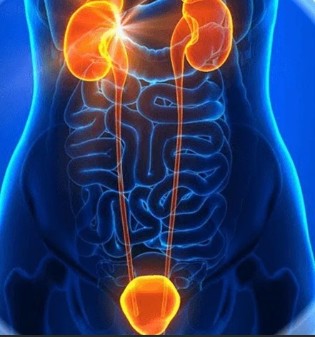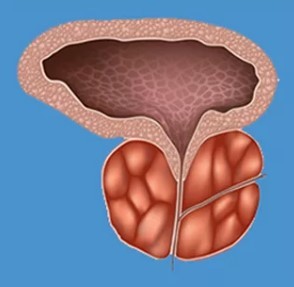Most of us are accustomed to, you need to carefully monitor the health of your heart, worry about the health of the lungs. But there are few men who remember that special care needs of their "second heart" - the prostate gland.
Is a small organ, about the size of a walnut. About where he is and what's meant knows not even every male. But it is often one of the most significant causes of health problems the male half of humanity. Moreover, the trouble can overtake a teenager, and an elderly "elder".
Like any other disease, inflammation of the prostate is the most common disease of the prostate is easier to prevent than to treat and easier to treat early than in the later stages. It is therefore essential that each man knew by heart the symptoms of approaching this disease, to be able in time to see a urologist.

Prostate gland or prostate is a musculo-glandular organ, which is part of the reproductive system of men. It is located in the pelvis, under the bladder, weighs only about 20-30 grams. The main function of the prostate, to speak in plain language – to produce fluid that is part of semen.
Despite its modest size (the size of a small chestnut), this little piece of iron can defeat any of Hercules.
As noted by the world health organization, every third man from among the inhabitants of the countries of Europe and the United States had symptoms of inflammation of the prostate gland. Every fifth man has a chronic prostatitis.
Adenoma of the prostate, which is similar with prostatitis symptoms, is diagnosed in 10-15% of men older than 50 years. The numbers are particularly concerned about the growing number of diseases of the prostate in young men, especially the chronic forms, and forms, leading to infertility.
To buy the inflammation of the prostate is easy, but it is treated for many years.
Urologists and andrologists – doctors who treat prostatitis, is often called the disease a "silent disease" because initially, it may not declare its existence. When the disease is noticed, as a rule, we are talking about the complications of inflammation of the prostate gland.
Every patient is different in its own special course of the disease and the causes of its occurrence.
The causes of the disease prostatitis
Prostatitis is an inflammation of the prostate gland. The main cause of the disease is a stagnation of blood in the pelvis. It can provoke disorders of the gastrointestinal tract that manifest in the form of frequent constipation and intestinal disorders. Among other reasons:
- immune system disorders;
- STDs, other communicable diseases;
- insufficiency of blood circulation in the penis;
- irregular sexual life;
- neuroendocrine disturbances in the body.
The symptoms of prostatitis
The characteristic symptoms of inflammation of the prostate gland is disruption of the urinary system. The reason is that when inflammation of the prostate increases in size and begins to squeeze the urethra. If untreated, the inflammatory process causes sclerosis of the bladder neck, and in the case of more severe development of the disease, the ureter may be completely blocked.
The second important characteristic symptom is the disorder of sexual function. This is manifested in the form of weakening of erection, weak intensity of orgasm. The result is impotence and infertility.
Other characteristic signs of prostatitis:
- burning sensation in perineum and urethra (the urethra);
- discomfort in the prostate and in the bladder when emptying the bowel (defecation);
- more frequent and increased intensity of urination;
- the difficulty and intermittent urination;
- discharge from the urethra pee bowel movement;
- urine noticeable floating "threads";
- there have been a long night, unexplained erection;
- acceleration of ejaculation during intercourse;
- effacement orgasm;
- the increase in General fatigue;
- depression, anxiety, mental distress waiting for the complications;
- the deterioration of an erection.

Not all of these symptoms are observed immediately. So do not expect only "bouquet," as only noticed one or two of the symptoms described above – just go to a specialist. Do not consult with friends, do not self-medicate, as each has its own symptoms and its own course of the disease.
Over time may be other symptoms. Appear:
- the pain is aching at the base of the root of the penis;
- pain in the scrotum;
- pain in the perineum.
Among the later symptoms doctors include including infertility, in which sperm are produced, but lose their mobility.
Strengthen aching pain may indicate that in the prostate formed stones. To get rid of them is much more difficult than stones in the kidney or even gallbladder. When detected, the doctor can use medications to slow their education further and increasing the available.
Often to the urologist apply on the stages, when prostatitis affects the work of other organs and systems. In this case we have to bring to the treatment and other professionals.
Who is at risk of getting prostatitis?
The risk groups include men who:

- lead a sedentary lifestyle;
- the representatives of the professions where you have to sit for 8 hours or more in a row;
- are observed to have chronic constipation;
- transferred infectious diseases of the genitourinary system;
- do not lead a regular sexual life;
- are promiscuous;
- suffering from alcoholism.
Diagnosis of inflammation of the prostate gland
In order to accurately determine the stage of the disease and prescribe the appropriate treatment will be carried out diagnostics, including:
- clinical examination;
- blood tests;
- urine;
- analysis of prostate secretion;
- Ultrasound;
- uroflowmetry.
What are the drugs treat?
At the end of the diagnostic tests doctors usually prescribed a complex treatment, comprising:
- treatment immune system;
- treatment of infections if any, will be identified, usually with antibiotics;
- antibacterial drugs for the treatment of what disease of the prostate.

For treatment of prostatitis are various physiotherapy treatments, such as:
- massage;
- magnetic resonance therapy;
- treatment with a laser;
- reflexology;
- ultrasound;
- hirudotherapy.
Prevention and diagnosis of prostatitis
Every man under the age of 40 years just have for the sake of your men's health every year to pass inspection at the urologist. After 40 this should be done every six months.
Over time is not cured or running inflammation of the prostate gland can lead to a number of the above complications, which can seriously complicate your life, not just sexual.
The main preventive measure is, of course, banal maintaining a healthy lifestyle. And because the blood stagnation in the pelvic organs is one of the most common causes of the disease, is necessary for all forces to compensate for sedentary and sedentary work with physical exercise, active rest.
It is important to avoid hypothermia, and to conduct a regular sex life.
























